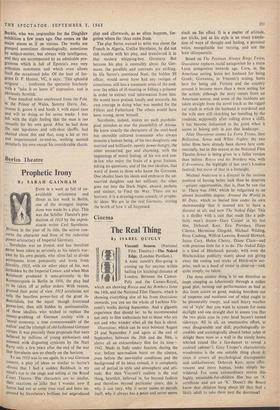Berlin Theatre
Prophetic Irony
By SARAH GA INHAM Sternheim was an ironist, and has therefore never been taken as seriously as his talents war- rant by his own people, who often fail to divide seriousness from pomposity and irony from frivolity. 1913, with six other plays of his, was forbidden by the Imperial Censor, and when Max Reinhardt produced it semi-privately in his Rammerspiele in Berlin in 1916, the play had to be taken off at police orders. With reason, granted their point of view. 1913 scrutinises not only the heartless power-lust of the great in- dustrialists, but the equal though frustrated Power-lust, then still hidden by sentimentality, of those idealists who wished to replace the money-grabbing of German society with a `moral economy, a true commonwealth of the nation' and the triumph of old-fashioned German virtues. It was precisely these proposals that were believed by millions of young enthusiasts and misused with disgusting cynicism by the Nazi Party only a few years after the end of the war that Sternheim saw so clearly on the horizon.
To see 1913 was to see again, in a real German Context, a play of ideas so similar to Sartre's. Altona that I had' a sudden flashback in my Mind's eye to the stage and setting at the Royal Court Theatre. The characters are so similar, their reactions so alike that I wonder now if Sartre had not at some time read and been im- pressed by Sternheim's brilliant but unproduced play and afterwards, as so often happens, for- gotten where the ideas came from.
The play Sartre wanted to write was about the French in Algeria. Unlike Sternheim, he did not risk trouble with his play, and transferred it to that modern whipping-boy, Germany. But because his play is ostensibly about the Ger- mans, the parallels and contrasts are striking. In life Sartre's convinced Nazi, the hidden SS officer, would never have had any twinges of conscience, still less a traumatic crisis of the soul, over the ethics of ill-treating or killing a prisoner in order to extract vital information from him. He would have praised, loudly and sincerely, his own courage in doing what was needed for the Fiihrer and Fatherland. The others would have been wrong, never himself.
Sternheim, .indeed, makes no such psycholo- gical mistakes as mar the plausibility of Altana. He knew exactly the characters of the steel-hard but smoothly cultured ironmaster who always remains a human being; of his two daughters, one married and brilliantly, openly power-hungry, the other unmarried, gay and charming, with the beginnings of moral feeling; of his son and son- in-law who enjoy the fruits of a great fortune, asking no questions; and of the two idealists, that word of doom to those who know the Germans. One idealist loses his ideals and embraces the un- married daughter and her millions; the other goes out into the Dark Night, absurd, pathetic and sinister, to Find the Way. There are no horrors; it is a drawing-room comedy of prophe- tic ideas. We are in the real Germany, stirring the broth of how it all happened.


































 Previous page
Previous page